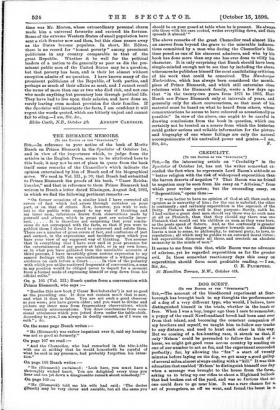CREDULITY.
[To THE EDITOR OF THE " SPECTATOR."1 STn,—In the interesting article on "Credulity" in the Spectator of October 1st, has not the writer somewhat ex- ceeded the fact when he represents Lord Bacon's attitude as "better religion with the risk of widespread superstition than the barren deserts of negation " ? That Bacon was no friend to negation may be seen from his essay on "Atheism," from which your writer quotes ; but the succeeding essay, on. "Superstition," opens thus :— "It were better to have no opinion of God at all, than such an opinion as is unworthy of him; for the one is unbelief, the other is contumely ; and certainly superstition is the reproach of the Deity. Plutarch saith well to that purpose : Surely, saith I had rather a great deal men should say there was no such man at all as Plutarch, than that they should say there was one Plutarch that would eat his children as soon as they were born, as the poets speak of Saturn. And, as the contumely is greater towards God, so the danger is greater towards men. Atheism' leaves a man to sense, to philosophy, to natural piety, to laws, to reputation ; all which may be guides to an outward moral virtue ;. but superstition dismounts all these, and erecteth an absolute monarchy in the minds of men."
It seems to me from this that, while Bacon was no advocate of atheism, yet he regarded superstition as far the greater
evil. In these somewhat reactionary days this essay OD superstition should form most profitable reading. — I am,,
36 Hamilton Terrace, N.W., October 6th.






































 Previous page
Previous page